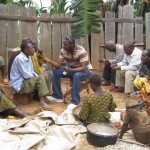Training Instills Desire to Change

SFCG teaches conflict resolution theory and practical mediation skills to help officials in Burundi mediate land disputes.
In Burundi, SFCG runs several programs to help resolve conflicts around land disputes. As explained in the previous blog, many of the disputes revolve around land that the owners abandoned in 1972. In the early 70’s Burundi experienced an ethnically motivated rebellion mainly in the South. The government responded by killing hundreds of thousands, and forcing an equal number to flee the country. They remained in exile for years, but started to return for the elections in 1992 and have been returning continuously. However, the land they left behind in 1972 was occupied or redistributed by local officials to those who remained. The returnees now claim their former land, but the land has been inhabited by others for decades. These land disputes pose a serious challenge to peace in Burundian society.
One of SFCG’s efforts to help with the resolution over the land disputes is the Conflict Transformation Training. The training is for staff and local collaborators of the National Commission for Land and Other Goods (CNTB). The CNTB resolves the land disputes by mediation in order to reduce the cases for the courts. The CNTB can provide several rounds of mediation but refrains from arbitration. If the mediation was successful and an agreement was reached, the document is legally binding. If no agreement was reached, the CNTB refers the disputants to litigation.
SFCG trains CNTB staff by familiarizing them with conflict resolution concepts as well as teaching practical mediation skills. Trainees are invited to share their own experiences with land conflict, and as a result many local collaborators have been convinced to resolve their own land disputes during while they were in the trainings.
The trainees are taught to interview conflicting parties separately before commencing a mediation, so as to develop an understanding of the context and a strategy for bringing the two sides together. Depending on the target audience, metaphorical props such as cassava plants and goats are used to help trainees integrate the new knowledge into their previous experience.
The training faces a number of challenges. First of all, several other NGOs are providing the CNTB with such conflict resolution trainings. It would be beneficial for all parties to compare the training curricula and identify overlaps to be more efficient instead of redundant. Another challenge SFCG is facing is the frequent replacement of local CNTB staff and collaborators. The training would be more efficient when it focuses on local officials that will serve long-term, rather than short-term. As elections are coming up in 2015, SFCG should also focus on developing a training curriculum to prepare elected officials for the election campaign.
The trainings help CNTB to become more successful mediators and they also have a direct effect on CNTB staff, as it instills a desire to resolve their own disputes.
SFCG hopes to continue its meaningful and popular work in Burundi and strives to ensure funding to be able to provide more training. However, it is only one of SFCG’s efforts to contribute to a peaceful resolution of the land disputes. Another method SFCG employs is the radio program Icibare Cacu as well as participatory theater. These efforts were described in previous blogs.
Learn more about our work in Burundi here








